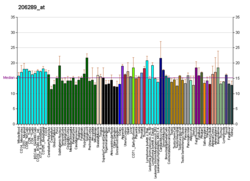Homeobox A4, also known as HOXA4, is a protein which in humans is encoded by the HOXA4 gene.[5][6]
Function
editIn vertebrates, the genes encoding the class of transcription factors called homeobox genes are found in clusters named A, B, C, and D on four separate chromosomes.[7] Expression of these proteins is spatially and temporally regulated during embryonic development. This gene is part of the A cluster on chromosome 7 and encodes a DNA-binding transcription factor which may regulate gene expression, morphogenesis, and differentiation.[5]
See also
editReferences
edit- ^ a b c GRCh38: Ensembl release 89: ENSG00000197576 – Ensembl, May 2017
- ^ a b c GRCm38: Ensembl release 89: ENSMUSG00000000942 – Ensembl, May 2017
- ^ "Human PubMed Reference:". National Center for Biotechnology Information, U.S. National Library of Medicine.
- ^ "Mouse PubMed Reference:". National Center for Biotechnology Information, U.S. National Library of Medicine.
- ^ a b "Entrez Gene: HOXA4 homeobox A4".
- ^ McAlpine PJ, Shows TB (July 1990). "Nomenclature for human homeobox genes". Genomics. 7 (3): 460. doi:10.1016/0888-7543(90)90186-X. PMID 1973146.
- ^ Scott MP (November 1992). "Vertebrate homeobox gene nomenclature". Cell. 71 (4): 551–553. doi:10.1016/0092-8674(92)90588-4. PMID 1358459. S2CID 13370372.
Further reading
edit- Scott MP (November 1992). "Vertebrate homeobox gene nomenclature". Cell. 71 (4): 551–553. doi:10.1016/0092-8674(92)90588-4. PMID 1358459. S2CID 13370372.
- Buettner R, Yim SO, Hong YS, Boncinelli E, Tainsky MA (July 1991). "Alteration of homeobox gene expression by N-ras transformation of PA-1 human teratocarcinoma cells". Molecular and Cellular Biology. 11 (7): 3573–3583. doi:10.1128/mcb.11.7.3573. PMC 361102. PMID 1675427.
- McAlpine PJ, Shows TB (July 1990). "Nomenclature for human homeobox genes". Genomics. 7 (3): 460. doi:10.1016/0888-7543(90)90186-X. PMID 1973146.
- Peverali FA, D'Esposito M, Acampora D, Bunone G, Negri M, Faiella A, et al. (October 1990). "Expression of HOX homeogenes in human neuroblastoma cell culture lines". Differentiation; Research in Biological Diversity. 45 (1): 61–69. doi:10.1111/j.1432-0436.1990.tb00458.x. PMID 1981366.
- Ferguson-Smith AC, Fienberg A, Ruddle FH (August 1989). "Isolation, chromosomal localization, and nucleotide sequence of the human HOX 1.4 homeobox". Genomics. 5 (2): 250–258. doi:10.1016/0888-7543(89)90054-2. PMID 2571574.
- Boncinelli E, Acampora D, Pannese M, D'Esposito M, Somma R, Gaudino G, et al. (1990). "Organization of human class I homeobox genes". Genome. 31 (2): 745–756. doi:10.1139/g89-133. PMID 2576652.
- Verlinsky Y, Morozov G, Gindilis V, Strom CM, Freidin M, Rechitsky S, et al. (June 1995). "Homeobox gene expression in human oocytes and preembryos". Molecular Reproduction and Development. 41 (2): 127–132. doi:10.1002/mrd.1080410202. PMID 7654365. S2CID 43123886.
- Apiou F, Flagiello D, Cillo C, Malfoy B, Poupon MF, Dutrillaux B (1996). "Fine mapping of human HOX gene clusters". Cytogenetics and Cell Genetics. 73 (1–2): 114–115. doi:10.1159/000134320. PMID 8646877.
- Kuliev A, Kukharenko V, Morozov G, Freidine M, Rechitsky S, Verlinsky O, et al. (February 1996). "Expression of homebox-containing genes in human preimplantation development and in embryos with chromosomal aneuploidies". Journal of Assisted Reproduction and Genetics. 13 (2): 177–181. doi:10.1007/BF02072541. PMID 8688592. S2CID 28126784.
- Duluc I, Lorentz O, Fritsch C, Leberquier C, Kedinger M, Freund JN (June 1997). "Changing intestinal connective tissue interactions alters homeobox gene expression in epithelial cells". Journal of Cell Science. 110 (11): 1317–1324. doi:10.1242/jcs.110.11.1317. PMID 9202392.
- Stelnicki EJ, Kömüves LG, Kwong AO, Holmes D, Klein P, Rozenfeld S, et al. (February 1998). "HOX homeobox genes exhibit spatial and temporal changes in expression during human skin development". The Journal of Investigative Dermatology. 110 (2): 110–115. doi:10.1046/j.1523-1747.1998.00092.x. PMID 9457903.
- Verlinsky Y, Morozov G, Verlinsky O, Koukharenko V, Rechitsky S, Goltsman E, et al. (June 1998). "Isolation of cDNA libraries from individual human preimplantation embryos". Molecular Human Reproduction. 4 (6): 571–575. doi:10.1093/molehr/4.6.571. PMID 9665340.
- Sanger Centre, Washington University Genome Sequencing Center (November 1998). "Toward a complete human genome sequence". Genome Research. 8 (11): 1097–1108. doi:10.1101/gr.8.11.1097. PMID 9847074.
- Kosaki K, Kosaki R, Suzuki T, Yoshihashi H, Takahashi T, Sasaki K, et al. (February 2002). "Complete mutation analysis panel of the 39 human HOX genes". Teratology. 65 (2): 50–62. doi:10.1002/tera.10009. PMID 11857506.
- Larramendy ML, Niini T, Elonen E, Nagy B, Ollila J, Vihinen M, et al. (June 2002). "Overexpression of translocation-associated fusion genes of FGFRI, MYC, NPMI, and DEK, but absence of the translocations in acute myeloid leukemia. A microarray analysis". Haematologica. 87 (6): 569–577. PMID 12031912.
- Méchine-Neuville A, Lefebvre O, Bellocq JP, Kedinger M, Simon-Assmann P (December 2002). "[Increased expression of HOXA9 gene in Hirschsprung disease]". Gastroenterologie Clinique et Biologique. 26 (12): 1110–1117. PMID 12520199.
- Strathdee G, Sim A, Parker A, Oscier D, Brown R (July 2006). "Promoter hypermethylation silences expression of the HoxA4 gene and correlates with IgVh mutational status in CLL". Leukemia. 20 (7): 1326–1329. doi:10.1038/sj.leu.2404254. PMID 16688227.
External links
edit- HOXA4+protein,+human at the U.S. National Library of Medicine Medical Subject Headings (MeSH)
This article incorporates text from the United States National Library of Medicine, which is in the public domain.




